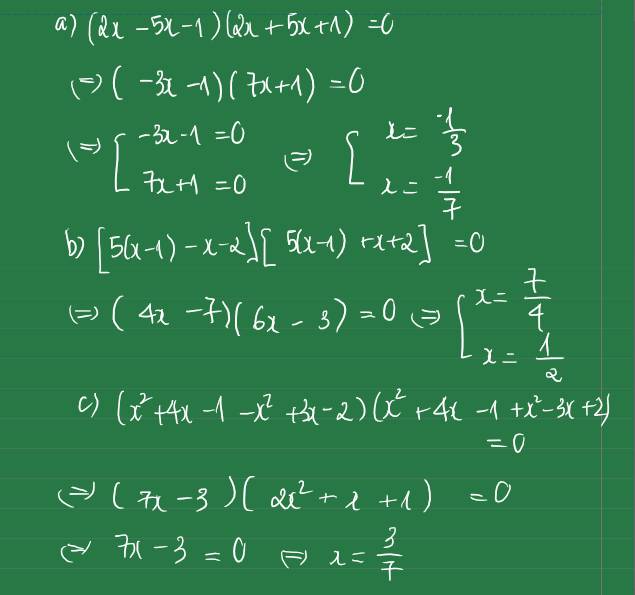
Hãy nhập câu hỏi của bạn vào đây, nếu là tài khoản VIP, bạn sẽ được ưu tiên trả lời.


a: =>(2x-5x-1)(2x+5x+1)=0
=>(-3x-1)(7x+1)=0
=>x=-1/3 hoặc x=-1/7
b: =>(5x-5)^2-(x+2)^2=0
=>(5x-5-x-2)(5x-5+x+2)=0
=>(4x-7)(6x-3)=0
=>x=1/2 hoặc x=7/4
c: =>(x^2+4x-1-x^2+3x-2)(x^2+4x-1+x^2-3x+2)=0
=>(7x-3)(2x^2+x+1)=0
=>7x-3=0
=>x=3/7

a) x(4x + 2) = 4x2 - 14
⇔ 4x2 + 2x = 4x2 - 14
⇔ 4x2 - 4x2 + 2x = -14
⇔ 2x = -14
⇔ x = -7
Vậy tập nghiệm S = ......
b) (x2 - 9)(2x - 1) = 0
⇔ x2 - 9 = 0 hoặc 2x - 1 = 0
⇔ x2 = 9 hoặc 2x = 1
⇔ x = 3 hoặc -3 hoặc x = \(\dfrac{1}{2}\)
Vậy .......
c) \(\dfrac{3}{x-2}\) + \(\dfrac{4}{x+2}\) = \(\dfrac{x-12}{x^2-4}\)
⇔ \(\dfrac{3}{x-2}\) + \(\dfrac{4}{x+2}\) = \(\dfrac{x-12}{\left(x-2\right)\left(x+2\right)}\)
ĐKXĐ: x - 2 ≠ 0 và x + 2 ≠ 0
⇔ x ≠ 2 và x ≠ -2MSC (mẫu số chung): (x - 2)(x + 2)Quy đồng mẫu hai vế và khử mẫu ta được:3x + 6 + 4x - 8 = x - 12⇔ 3x + 4x - x = 8 - 6 - 12⇔ 6x = -10⇔ x = \(-\dfrac{5}{3}\) (nhận)Vậy ........
=>(2x-1)2=9
=>2x-1=3 hoặc 2x-1=-3
=>2x=4 hoặc 2x=-2
=>x=2 hoặc x=-1
=>(2x-1)2=9
=>2x-1=3 hoặc 2x-1=-3
=>2x=4 hoặc 2x=-2
=>x=2 hoặc x=-1

\(\Leftrightarrow2x^3-2x+x^2-1-4x^2+2x+2=0\)
\(\Leftrightarrow2x^3-3x^2+1=0\)
\(\Leftrightarrow2x^3-2x^2-x^2+1=0\)
\(\Leftrightarrow2x^2\left(x-1\right)-\left(x-1\right)\left(x+1\right)=0\)
\(\Leftrightarrow\left(x-1\right)\left(2x^2-x-1\right)=0\)
\(\Leftrightarrow\left(x-1\right)\left(2x^2-2x+x-1\right)=0\)
\(\Leftrightarrow\left(x-1\right)^2\left(2x+1\right)=0\)
=>x=1 hoặc x=-1/2
\(\left(2x+1\right)\left(x^2-1\right)=4x^2-2x-2\\ \Leftrightarrow\left(2x+1\right)\left(x-1\right)\left(x+1\right)=4x^2-4x+2x-2\\ \Leftrightarrow\left(2x+1\right)\left(x-1\right)\left(x+1\right)=4x\left(x-1\right)+2\left(x-1\right)\\ \Leftrightarrow\left(2x+1\right)\left(x-1\right)\left(x+1\right)=\left(4x+2\right)\left(x-1\right)\\ \Leftrightarrow\left(2x+1\right)\left(x-1\right)\left(x+1\right)=2\left(2x+1\right)\left(x-1\right)\\ \Leftrightarrow\left(2x+1\right)\left(x-1\right)\left(x+1\right)-2\left(2x+1\right)\left(x-1\right)=0\\ \Leftrightarrow\left(2x+1\right)\left(x-1\right)\left(x+1-2\right)=0\\ \Leftrightarrow\left(2x+1\right)\left(x-1\right)^2=0\\ \Leftrightarrow\left[{}\begin{matrix}x=-\dfrac{1}{2}\\x=1\end{matrix}\right.\)

X é t p h ư ơ n g t r ì n h 1 t a c ó x + 2 3 + x - 3 3 = 0 1 x + 2 3 - 3 - x 3 = 0 x + 2 3 = 3 - x 3 x + 2 = 3 - x 2 x = 1 x = 1 2 X é t p h ư ơ n g t r ì n h 2 t a c ó x 2 + x - 1 2 + 4 x 2 + 4 x = 0 2 x 2 + x - 1 2 + 4 x 2 + 4 x - 4 + 4 = 0 x 2 + x - 1 2 + 4 x 2 + x - 1 + 4 = 0 x 2 + x - 1 + 2 2 = 0 x 2 + x + 1 2 = 0 x 2 + x + 1 = 0 x 2 + x + 1 4 + 3 4 = 0 x + 1 2 2 + 3 4 = 0 V ì x + 1 2 2 + 3 4 > 0 , ∀ x n ê n p h ư ơ n g t r ì n h 2 v ô n g h i ệ m
Vậy Phương trình (1) có 1 nghiệm, phương trình (2) vô nghiệm
Đáp án cần chọn là: D





4x2 + 4x + 1 = x2
⇔ 4x2 + 4x + 1 – x2 = 0
⇔ (4x2 + 4x + 1) – x2 = 0
⇔ (2x + 1)2 – x2 = 0
⇔ (2x + 1 – x)(2x + 1 + x) = 0
(Sử dụng hằng đẳng thức)
⇔ (x + 1)(3x + 1) = 0
⇔ x + 1 = 0 hoặc 3x + 1 = 0
+ x + 1 = 0 ⇔ x = -1.
+ 3x + 1 = 0 ⇔ 3x = -1 ⇔
Vậy phương trình có tập nghiệm